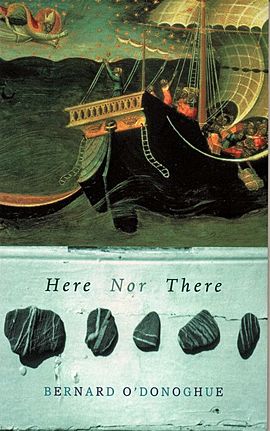Bernard O'Donoghue facts for kids
Quick facts for kids
Bernard O'Donoghue
|
|
|---|---|
| Born | 14 December 1945 (age 77) Cullen, County Cork, Ireland
|
| Occupation | poet, academic, author |
| Years active | 1970-Present |
Bernard O'Donoghue is a well-known Irish poet and a former university professor. He was born on December 14, 1945. He is famous for his poetry, which often talks about his childhood in Ireland and his life in England. He is also a Fellow of the Royal Society of Literature.
Contents
Early Life and School Days
Bernard O'Donoghue grew up on a farm in Cullen, County Cork, Ireland. He started learning the Irish language at school when he was five. He also helped at Mass from about age ten, which he said made him interested in medieval times.
When he was 16, his father passed away suddenly. His family then moved from Ireland to Manchester, England. He went to St Bede's College, a Catholic school. In 1965, he went to Lincoln College, Oxford to study English literature. He studied everything from old English stories like Beowulf to modern writers like Virginia Woolf.
Career and Teaching
After working for a year as a computer programmer at IBM, O'Donoghue returned to Oxford. He studied Medieval studies at Lincoln College. He has lived in Oxford ever since, but he visits County Cork every year. He believes having two places gives him different ways of looking at things.
From 1971 to 1995, he was a lecturer in English at Magdalen College, Oxford. He started writing poetry there because his friend, John Fuller, ran the college poetry club. To join, you had to write a poem, so that's how he began.
In 1995, O'Donoghue moved to Wadham College, Oxford. He became a Fellow and tutor in medieval English literature and the English language. He was an expert in Chaucer's works. He also taught Modern Irish Literature, especially poetry. Some of his students became famous, like actress Rosamund Pike and writer Alan Hollinghurst. O'Donoghue stopped teaching in 2011 but stayed at Wadham as an emeritus fellow.
His Poetry Collections
Bernard O'Donoghue's first poetry book was Razorblades and Pencils. It was published in 1982 by John Fuller's small publishing company, The Sycamore Press. Fuller also published famous poets like W. H. Auden.
Next came Poaching Rights in 1987, published by Peter Fallon in Ireland. Then, The Absent Signifier came out in 1990.
His book The Weakness was published in 1992. O'Donoghue thought this was his most important work from his time at Magdalen. His next book, Gunpowder (1995), won the 1995 Whitbread prize for Poetry. He felt that the award for Gunpowder might have also recognized the strong poems in The Weakness.

Here Nor There (1999) includes a popular poem called Ter Conatus. This poem is about a brother and sister who cannot touch each other. The title means "having tried three times." It comes from an old story where a hero tries three times to hug loved ones who are no longer alive. In O'Donoghue’s poem, the brother tries three times to touch his sick sister, but his hand always falls back.
O'Donoghue chose a medieval painting for the cover of Here Nor There. This showed his love for medieval art and old English poems like The Seafarer. He said these old poems were his "model for the perfectly-formed short poem."
Death is a common theme in O'Donoghue’s poetry, especially in Outliving (2003). This collection begins with The Day I Outlived My Father, which has sad opening lines. This poem is often read by the author at poetry events. When his Selected Poems was published in 2008, it included 100 works. Many of these poems remember his childhood in rural Cork and how he felt about being away from home.
Old English themes appear again in Farmer's Cross (2011). This book includes O'Donoghue's excellent translation of the Old English poem The Wanderer. Both Farmer's Cross and his next collection, The Seasons of Cullen Church (2016), were nominated for the T. S. Eliot Prize. In The Seasons of Cullen Church, his father appears again in a poem, saying, "'Time to go back,' he said./ And I don't know if I will get away again.'"
The Irish poet Brendan Kennelly once said that O'Donoghue's poems focus more on stories than on big ideas. O'Donoghue agreed, saying that the story is always the most important part.
Other Writings
O'Donoghue has also written about modern poetry. He wrote two studies about the poet Seamus Heaney. The first was Seamus Heaney and the Language of Poetry (1995). The second was The Cambridge Companion to Seamus Heaney (2008). This book included essays about Heaney's work and an introduction by O'Donoghue.
He also helped edit C. Day-Lewis: The Golden Bridle (2017). This book aimed to show how important C. Day-Lewis was as a poet in the 20th century.
O'Donoghue has translated other works too. He translated poems by the Czech writer Zbyněk Hejda in A Stay in a Sanatorium and other poetry (2005). He also created a new translation of Sir Gawain and the Green Knight (2006). This is an important old English story.
Earlier in his career, O'Donoghue wrote about medieval topics. These included The Courtly Love Tradition (1982) and Thomas Hoccleve Selected Poems (1982). Later, he put together Oxford Irish Quotations (1999). This book had over two thousand quotes, including one from W. B. Yeats about how Irish literature inspired him.
Awards and Recognition
Bernard O'Donoghue won the 1995 Whitbread prize for Poetry for his book Gunpowder. He also received the Cholmondeley Award in 2009. His books have been nominated for the T.S. Eliot Prize many times.
In 1999, he was chosen as a Fellow of the Royal Society of Literature. In 2014, he took over from Seamus Heaney as the Honorary President of the Irish Literary Society of London.

